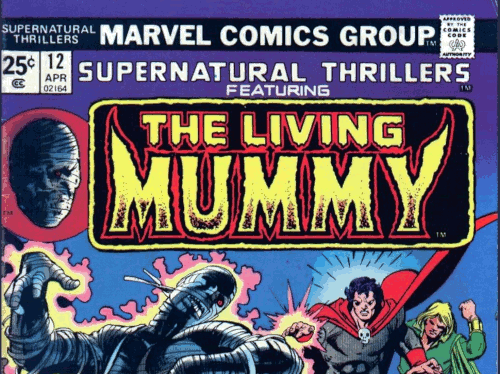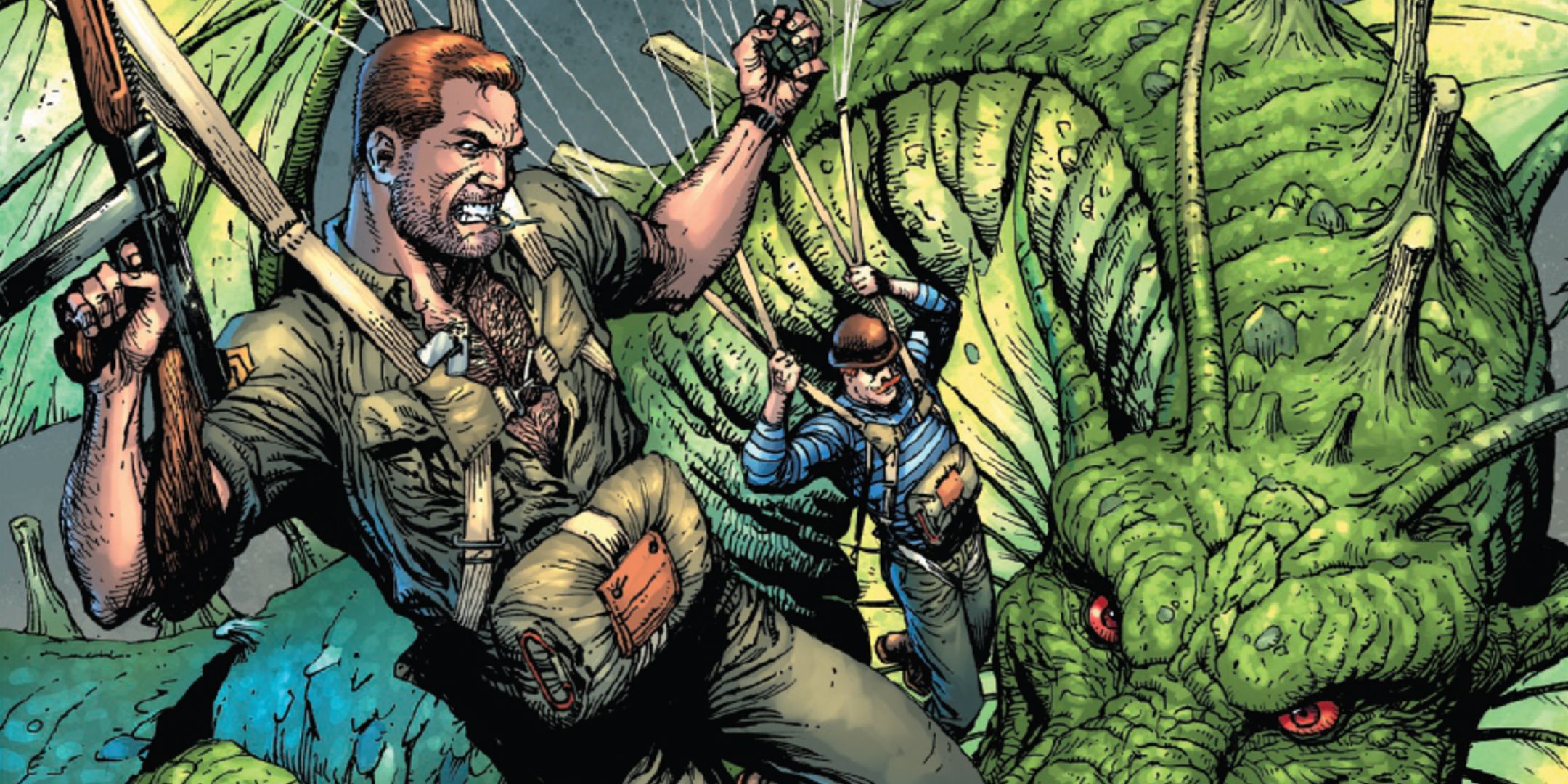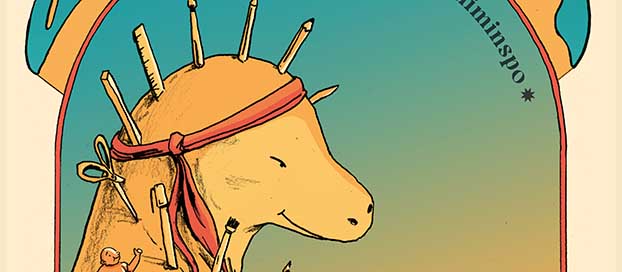Clark Burscough | April 11, 2025
Heading into Calvinball territory this week, whereupon the only confirmed known is to constantly expect the unknown. Bear or bull market? Long odds or short? Nobody can ever truly know, even in their heart-of-hearts. The only constant is, and always will be, this week’s links, below.
— Alariko (@alariko.bsky.social) 2025-04-07T14:29:22.238Z
This week’s news.
• Tossing the lawsuit/tariffs coin, as it lands tariffs side up, meaning we start this week with discussion of what newly-announced and then newly-paused import duties may mean for the comics industry, as “printed books…and similar printed matter” are currently still exempted from the Trump administration’s tariffs, but impacts on consumers’ disposable income still abound, and exemptions may be changed at any point, one assumes, leaving publishers sounding a cautious note.
• Moving to the other face of the coin for 2025, as last month’s announcement that Alliance Entertainment would be buying the majority of Diamond Comic Distributors’ assets appears to have been premature, with the latter now deciding that they would rather be bought by Universal Distribution and Ad Populum, leading to Alliance filing suit against Diamond to block this move, with accusations that the distributor “acted with extreme bad faith in the period following the Auction” which lead to Alliance’s previously winning bid of over $72 million — a timeline of events from related dockets can be dipped into here.
• As reported this week, here at TCJ, Hiveworks Comics is preparing to wind down printing, publishing, and crowdfunding operations this year, in order to focus on web services — a number of former clients of the company have severed ties in recent weeks, opting to host their webcomics independently.
• News was also shared this week that a crowdfunding campaign for documentary Stan Lee: The Final Chapter would be cancelled, with independent financing instead announced by director Jonathan Bolerjack — the documentary’s crowdfunding campaign was not the best-received, with some commenting on the film’s framing of alleged exploitation of its subject, but did receive some fairly high-profile support from certain members of the comics industry.
• In other crowdfunding news, the Toronto Comics Art Festival announced the opening of a campaign drive to keep the festival free and support increased expenses with the event’s imminent move to Toronto Metropolitan University’s Mattamy Athletic Centre.
THE FROG AND THE SNAKE
— BAKER (@fuckyoubaker.bsky.social) 2025-04-10T00:22:52.577Z
This week’s reviews.
TCJ
• Brian Nicholson reviews the contrasting worlds of Imai Arata’s Flash Point, translated by Rua Holmberg - “The book is drawn in a much smoother style than Arata’s previous book F, which gave a scribbled texture to all its spotted blacks, and gnarled every line with little curlicues. The only hint of a rough edge remaining is the slashed line on Imai-Kun’s forehead, that indicates an eyebrow but flies off the face. With the expressionist qualities tamped down, the work feels cleaner and less abrasive.”
• Zach Rabiroff reviews the effective hectoring of Joe Sacco’s The War on Gaza - “It makes a certain amount of sense, then, that Sacco has approached this new project in a manner entirely opposite from his earlier work. The War on Gaza is not the result of particularized first-hand reporting; rather, it is a distillation of facts and figures as they had been assembled over the course of the year the war had been progressing: death counts, vignettes of reported war, images of unfathomable military violence, presented with a drum-beat urgency that rarely pauses for breath over the course of its 32 pages.”
AIPT
• David Brooke reviews the balanced nostalgia of Nick Winn’s Adventure Time #1.
• Marvel Maximus reviews the sitcom setup of Joanne Starer, Stephen Byrne, et al’s Fire & Ice: When Hell Freezes Over #1.
• Jennifer Chu reviews the costume change of G. Willow Wilson, Gavin Guidry, et al’s Action Comics #1085.
• Colin Moon reviews the lasting legacy of Marvel Comics’ Rom Epic Collection: The Original Marvel Years Volume 1.
• Ryan Sonneville reviews the uneven satire of Mark Russell, Bob Quinn, et al's X-Factor: Please Like and Share.
The Beat
• Zack Quaintance reviews the stunning visualisation of Fred Fordham’s adaptation of Ursula K. Le Guin’s A Wizard of Earthsea, and the flowing inventiveness of Kayla E.’s Precious Rubbish.
• AJ Frost reviews the revolutionary clarity of Raina Telgemeier and Scott McCloud’s The Cartoonists Club.
• Tim Rooney reviews the disjointed plot of Joe Kelly, Pepe Larraz, et al’s Amazing Spider-Man #1.
• Diego Higuera reviews the twisted iconography of Scott Snyder, Marcos Martín, et al’s Absolute Batman #7.
• Jordan Jennings reviews the vibrant energy of Nick Winn’s Adventure Time #1.
• Jared Bird reviews the dark humour of Daniel Warren Johnson, Ludo Lullabi, et al’s Transformers #19.
Broken Frontier
• Lindsay Pereira reviews the powerful contrasts of Lawrence Lindell’s We All Got Something.
• Gary Usher reviews the sharp pacing of Bim Eriksson’s Baby Blue, translate by Melissa Bowers; and the stylistic range of Sean Azzopardi’s Life’s a Party: Not Red Deeps!.
Four Color Apocalypse
Ryan Carey reviews the ambitious approach of Joe Walsh’s The Shifting Ground, Volume 1 and the winning line of Fran López's They Must Know What They're Doing.
French Studies: A Quarterly Review
Maaheen Ahmed reviews the refreshing insights of Drawing (in) the Feminine: ‘Bande Dessinée’ and Women, edited by Margaret C. Flinn.
The Guardian
• Rachel Cooke reviews the creative alchemy of Paul Karasik, David Mazzucchelli, and Lorenzo Mattotti’s adaptation of Paul Auster’s The New York Trilogy.
• Claire Cao reviews the formal experimentation of Rachel Ang’s I Ate the Whole World to Find You.
House to Astonish
Paul O’Brien has capsule reviews of Marvel Comics’ Astonishing X-Men Infinity Comic #16, X-Men #14, Psylocke #6, Hellverine #5, and Concert of Champions #1.
The New York Times
James Sturm reviews the connective memories of Raina Telgemeier and Scott McCloud’s The Cartoonists Club and Jerry Craft and Kwame Alexander’s J vs. K.
PopMatters
Jesse Kavadlo reviews the free-flowing pacing of Kristian Williams’ The Illuminist: Philosophical Explorations in the Work of Alan Moore.
Solrad
Hagai Palevsky reviews the narrative sins of Dominique Grange and Jacques Tardi’s Elise and the New Partisans, translated by Jenna Allen.
Yatta-tachi
wendeego reviews the structural strengths of Fumi Yoshinaga’s Tamaki and Amane.
my day job lol
— Tom McH (@tommchenry.bsky.social) 2025-04-10T00:05:27.855Z
This week’s interviews.
TCJ
• Jason Bergman interviews Kyle Baker about the last quarter century of comics making, working across media, and recollections of the various books that came from that span of time - “I'm doing print-on-demand, yeah. I don't do launches or any of that stuff. Right now I'm just trying to get the stories done. I'm at an age where I don't really know how many years I got left. Being like, physically viable. I just want to get the books done that I want to get done before it’s too late. I got my whole life to sell stuff.”
• Roger Skalbeck interviews Chris Irving about the history of Victor Fox and Fox Feature Syndicate, The Blue Beetle, law and comics convergences, and the allure of Fox as a subject of study - “What I think is so important about all of this work, and I think it's why we need to find as much of this documentation as possible, is comics history for that era is mostly based on recollections by creators. Look at what happened with Will Eisner and Wonder Man, where he claimed to not have backed up Fox in court. And then, we saw the court documents, where it felt like the lawyer was successfully pulling things out of Will.”
AIPT
• Chris Coplan speaks with Curt Pires about Lost Fantasy and video game swords, and Jake Smith about RoboWolf and story hooks.
• David Brooke talks to Mark Waid about We Are Yesterday and (re)connecting the DCU, Nick Winn about Adventure Time and character line-ups, and Ivan Cohen about Giant-Size Wacky Races and team sponsorships.
Broken Frontier
Lydia Turner speaks with Paige Hender about The Confessional, comic making origins, seeing the finished product, and whether all vampires are good vampires.
The Guardian
Jenny Kleeman interviews Rebecca Burke about being detained by ICE while travelling between the US and Canada, conditions in the detention centre, and drawing portraits of fellow detainees.
neaToday
Cindy Long speaks with Tim Smyth and Janna Tropper about utilising comic books in the classroom, and the varied subjects they can help students engage with.
Publisher’s Weekly
Tobias Carroll talks to Dan Nadel about Crumb: A Cartoonist’s Life, history with the work of R. Crumb, comics counterculture evolutions, and favourites of Crumb’s comics.
USA Today
Clare Mulroy interviews Scott McCloud and Raina Telgemeier about The Cartoonists Club, the genesis of the book, the importance of school libraries, and the core message of the project.
St. Louis Public Radio
Laura Spencer talks to Soman Chainani about Coven, publisher pitches, schools visits, and the allegorical nature of the book.
Style Weekly
Sommer Browning interviews Kayla E. about Precious Rubbish, the traumatising aspect of the work, childhood newspaper strip reading, and lessons learned from the finished book.
just the general vibe right now
— 𝕕𝕖𝕡𝕣𝕒𝕧𝕖𝕕 𝕖𝕘𝕘 (@vreni.bsky.social) 2025-04-09T21:37:03.647Z
This week’s features and longreads.
• Here at TCJ, Jacob Walhout writes on the Krakoan Era of Marvel Comics’ X-Men line, the inherently personal nature of fandom, and the act of connecting to universes and storylines and characters from corporately-owned comics media - “So, Krakoa means a lot of things. And the word “Krakoa” means a lot of things. It’s a mutant island, a mutant nation-state, the idea of mutant separatism, the threat of mutant supremacy, a new era in the history of the X-Men, a new era™ in the history of the X-Men™, a visual vocabulary, a “soft reboot,” and line-wide collaborative comics-writing. “Krakoa” spans a host of enmeshed contexts: fictional, inter- and intra-textual, personal, communal, and economic. And this definitional sprawl mirrors, at least by analogy, the complex implications and implicatedness of reading, writing, and being a fan of comics that flow from the bowels of perhaps the modern American corporation.”
• For Print, Steven Heller writes in remembrance of artist and advocate Brad Holland, who died last month following heart surgery at the age of 81.
• For The Atlantic, Art Spiegelman writes in remembrance of Jules Feiffer, who died in January this year at the age of 95, and personal enjoyment of the strip Oh God!.
• Elsewhere, at Comics Kingdom, Amy Anderson writes in remembrance of cartoonist Hy Eisman, who died last month at the age of 98.
• Over at The New York Times, Michael Paulson writes on the history of Betty Boop, as Boop! The Musical hits Broadway, looking at the character evolutions that Ms. Boop has experienced over the years.
• Autobiographix’s Amaris Ketcham presents the second part of Comix and the Love of Place, discussing the relationship between texts and image, and the importance of language when establishing a sense of place.
• For Shelfdust, Jim Dandeneau continues the site’s retrospective of Matt Fraction and Steve Leiber’s Superman’s Pal Jimmy Olsen, looking back on issue 6 of the series and the interpersonal relationships to be found therein.
• Broken Frontier presents a fresh Covers Album, as David Avallone writes on a trio of covers from across the Big Two divide.
• From the world of open-access academia, in the Journal of Graphic Novels and Comics, Arundhati Sethi examines Ali Fitzgerald’s Drawn to Berlin, and the radical optics of the refugee crisis embodied by the comic.
• For Technology in Society, Alessandro Muscio and Matteo Farinella analyse the potential for comics to promote scientific research, and the extent to which this is mitigated by certain comics’ apparent commitment to depicting the stereotype of the mad scientist.
• In Applied Phycology, giving an example of such scientific promotion through comics, Paula Fajardo, Martiña Ferreira, Celina Costas, Maria J. Chapelaa, J. M. Vilariño, and Xulia Pisón present a paper on producing a trilogy of comics to raise public awareness on microalgae.
• Paul O’Brien’s census of the villains of Daredevil continues, over at House to Astonish, as this edition Marv Wolfman calls (telepathic) surf’s up with Mind-Wave.
• Mike Peterson rounds up the week’s editorial beat, over at The Daily Cartoonist, as tariffs upon tariffs beget naught but trade war until they’re once more yanked back behind the curtain.
— Ben Passmore (@benpassmore.bsky.social) 2025-04-05T17:59:27.408Z
This week’s audio/visual delights.
• Noah Van Sciver’s cartoonist chats returned this week, as Sacha Mardou joined proceedings to discuss Past Tense, teenage years being raised as a Jehovah’s Witness, childhood traumas on the page, and drawing/writing balances.
• Henry Chamberlain was joined by Paul Karasik for the latest Comics Grinder, as they spoke about adapting Paul Auster’s The New York Trilogy, the strange detours of the source material, the origins of the project, and the creative freedom afforded by Auster.
• Fantom Comics hosted a virtual talk between David Brothers and Emma Ríos about Anzuelo, creating and editing the book, selecting the type of sea for the story, choosing the graphic novel format, and the realities of making a living from comics.
• David Harper welcomed James Tynion IV and Michael Walsh to Off Panel, as they spoke about Exquisite Corpses, shaping the book’s iterative form, convention travelling, cosplayer, and comics making in the year 2025.
• Calvin Reid and Meg Lemke presented more interviews from the floor of this year’s MoCCA Festival, for Publisher’s Weekly’s More to Come, as they spoke with Ellen Lindner, Matt Madden, Boum, Melissa Chan & Badiucauo
• For more from Chan and Badiucao, the Wende Museum hosted a talk from the authors about You Must Take Part in Revolution, art as activism, engaging new audiences, the forms resistance takes to effect meaningful change, and sociopolitical differences between the US and China.
• Gary Lactus, Al To Astonish and (eventually) Maid Of Nails convened to float across SILENCE!’s Drifting Reviewniverse, as Tony Isabella and Sal Buscema’s Ghost Rider #11 and associated advertising inserts, required two-parts to be fully digested.
Hot damn I love 90's Jubilee!Done while table-sitting for @stevelieberart.bsky.social this morning.
— Cat Farris (@cattifer.bsky.social) 2025-03-08T20:18:13.541Z
No more links this week, because I need to spend all available time recalculating whether my pension still exists.
Just for fun :)
— Daniel Warren Johnson (@danielwarrenart.bsky.social) 2025-04-01T16:01:04.640Z



















 English (US) ·
English (US) ·